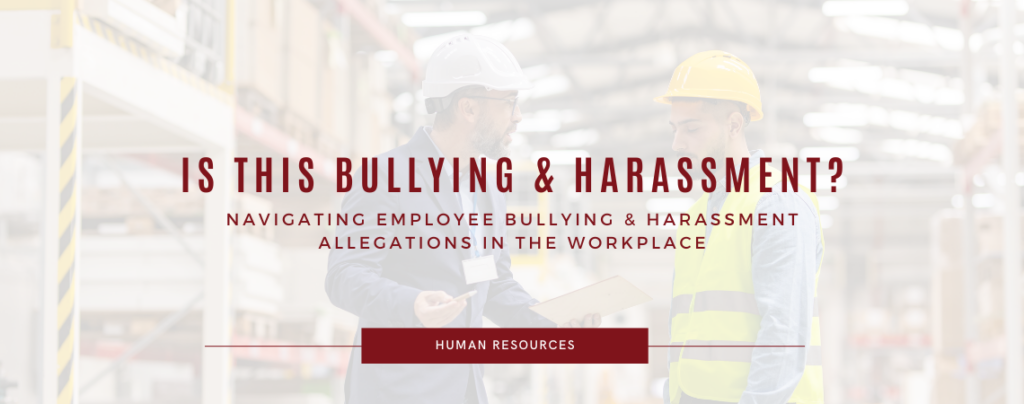
As a leader, you encounter a variety of employee concerns every single day. One particularly tricky area is navigating complaints of bullying or harassment. You might find yourself wondering: “Is this bullying and harassment… or just workplace drama?”
The line between a heated discussion and a hostile work environment can be blurry.
In this blog post, we explore these issues and how to address them effectively.
Distinguishing Between Conflict and Harassment
Disagreements are a normal part of any workplace. However, true harassment involves repeated, unwelcome conduct that creates a hostile environment for an employee.
Harassment can be verbal (yelling, insults), nonverbal (intimidation, unwelcome physical contact), or written (offensive emails, social media posts).
Unlike a one-time argument, harassment is a pattern of behaviour that makes someone feel unsafe or uncomfortable.
Understanding Your Obligations
Workplaces in Canada are legally obligated to maintain a professional and respectful environment, free from harassment. This means taking complaints seriously and conducting thorough investigations. Failure to address these issues can lead to costly lawsuits and a negatively impacted company culture.
Identifying Potential Issues
You might be wondering: “Is this behaviour bullying and / or harassment?”. Here are some red flags that a situation might be escalating towards harassment:
- Persistent Negativity: An employee constantly criticizes another’s work, often in front of others. The criticism is nitpicking, lacks constructive suggestions, and focuses on personality traits rather than performance.
- Exclusion: An employee consistently excludes another from important meetings, projects, or social events. This could be intentional or through manipulation of schedules and information sharing.
- Humiliation: An employee belittles another publicly, makes offensive jokes at their expense, or uses intimidating language to control their behaviour.
- Threats: An employee threatens another with job loss, disciplinary action, or even violence, either directly or through veiled comments.
- Targeted Behaviour: The negative behaviour seems focused on a protected characteristic like race, religion, disability, gender, or sexual orientation.
Responding to a Complaint
If an employee files a complaint of bullying or harassment, take immediate action.
Here’s what you should do:
- Treat the Complaint Seriously: Convey to the employee that their concerns are important.
- Gather Information: Initiate a formal investigation. This may involve interviewing the employee, the accused, and potential witnesses. Maintain detailed records of the investigation.
- Maintain Neutrality: Avoid pre-judging the situation. Conduct a fair and impartial investigation.
Addressing the Issue
Once the investigation concludes, take appropriate action. If the complaint is substantiated, you might need to:
- Implement Disciplinary Measures: This can range from a verbal warning to termination, depending on the severity of the behaviour.
- Mediation: Encourage the involved parties to work out a solution through mediation, if appropriate.
- Anti-Harassment Training: Provide training for both the employee who filed the complaint and the accused, as well as other employees, to prevent future incidents.
Remember
- Foster a respectful workplace for all. A culture of open communication encourages employees to speak up about inappropriate behaviour.
- Prioritize a fair and thorough investigation. This shows your commitment to a safe and professional environment for all employees.
- Address these issues promptly. Ignoring complaints can lead to further problems and legal repercussions.
By understanding the signs of bullying and harassment and taking proactive steps, you can create a positive, safe, and productive work environment for everyone!
Still feeling unsure about dealing with bullying and harassment on your own? Our team of HR professionals are here to help!